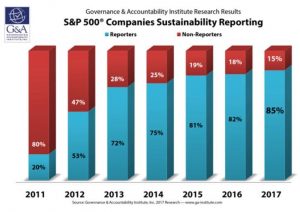This website uses cookies so that we can provide you with the best user experience possible. Cookie information is stored in your browser and performs functions such as recognising you when you return to our website and helping our team to understand which sections of the website you find most interesting and useful.
February 14, 2019
From Management to Leadership: How Operating Executives Today Can Lead with ESG
This blog is the second in a multi-part series to help Sustainability and Operating Executives communicate the business case for an ESG Strategy in a way that resonates with the C-Suite.
In a previous blog post ESG Performance Is Now A Mainstream Driver for Shareholder Value, we reviewed some of the persuasive emerging evidence in support of the crystal-clear business case for Corporate Sustainability and C-suite support for strong ESG performance. Even since that blog post, the latest E&Y 2018 Global Climate Change and Sustainability Services investor survey contributed to the tsunami of evidence supporting the importance of ESG management, as it reveals that 97% of investors consider non-financial disclosure in evaluating investment decisions with 89% calling for integrated reporting[1].
With all this evidence in hand, we can conclude that an organized commitment to Corporate Sustainability, manifest in ESG performance, has “crossed the chasm” as a management approach and passed from an Early Adopter Phase to the Early Majority Phase, where disproportionate benefits will accrue most to those on the front end of the phase.[2]
- In 2017, 85% of S&P companies report on their Corporate Sustainability programs[3]
- More than 60% of the Fortune 100, and nearly 50% of the Fortune 500, have set public ESG performance targets[4]
- As of this writing, 162 companies (and counting) have committed publicly to the RE100 and 100% renewable energy sourcing
And with this advance the stakes are increasing. Today, the option of not joining the leaders above is posing higher brand risks for senior management:
- A large and growing number of important stakeholders (not just investors, but talent, customers and in an increasing number of business sectors, competitors) see a strong and active Corporate Sustainability program as a signal of a “switched-on”, innovative leadership team that will outperform the competition over time.
- Conversely, if a management team does NOT have leadership performance in its Corporate Sustainability strategy, given the preponderance of evidence and actions taken by so many leading corporations today, then what else are they missing to drive and maintain their long-term competitive advantage and uninterrupted shareholder value growth?
- An increasing number of consumers and commercial customers (in part, driven by their customers), will devalue doing business with companies that are not taking responsibility for the hidden costs (including the costs to those customers) of their business.
The above, along with the evidence highlighted in our prior blog ESG Performance Is Now A Mainstream Driver for Shareholder Value, has brought ESG performance front and center for every Board of Directors, CEO and C-Suite managing a public corporation in 2019. Even private companies are paying attention, as the above indicates that their company’s overall true valuation can be influenced by their ESG performance.
The Opportunity: Capturing Disproportionate Benefits for Early Majority
So, here’s the challenge: C-Suite management is increasingly looking for solutions to a problem they do not fully understand. They are busy driving financial performance (as per the above) and are not aware of what can be done today to profitably align their brand with strong ESG performance. Coupled with that, they are sure they do not want to make public (or even private) promises on which they cannot deliver.
Enter the “Management to Leadership” opportunity for middle management Corporate Real Estate (CRE) / Operating executives that we first highlighted in our 2016 CoreNet article “An Unprecedented Opportunity for CRE”. This is exactly where middle management operating executives have a special opportunity to lead on ESG management. While global products companies have to-date deployed sophisticated marketing and supply chain strategies focused on greater global responsibility, the knowledge worker-intensive corporate operations represents an important leadership opportunity for most companies. This is particularly pronounced in service sector companies who do not have responsibility for large manufacturing / supply chain footprint. The space, energy, waste, water and relevant employee engagement long managed by CRE constitutes most of service companies’ environmental impact and makes it possible for CRE and operations to smartly lead on ESG management in a manner that will resonate with the C-Suite. There is an opportunity for middle-managers willing to move beyond an exclusive focus on individual project ROIs, and instead (or additionally) propose the development of a strategy for more “Sustainable Operations” that evolves beyond their traditional (though appropriate) obsession with efficiency. This can be done in a manner that enfranchises additional functions like Human Resources, IT, Procurement and Compliance and better organizes and energizes the conventional commitment to greater efficiency through the added focus incorporating social and environmental performance.
To help middle managers lead on this latent opportunity for the company, catch-up to this megatrend and not miss out on the disproportionate benefits afforded to the Early Majority adopters, we pose some key questions. Operating, CSR, and Sustainability executives can examine these questions to help them build an internal understanding for why Corporate Sustainability has “arrived” as a more strategic approach to management in a world of rising resource constraints, and how their company can profitably follow those corporate leaders in the Early Adopter phase:
- Is there a no first capital, cost savings, approach to committing publicly to 100% renewable energy and carbon neutrality with a set target achievement date?
- What would be entailed in setting Science-Based Targets to ensure alignment with global efforts to avoid more than 2oC rise in global temperature?
- Is there a no first capital, cost savings approach that would enable us to set public targets for at least 20% waste reduction and 80% landfill diversion?
- What can we do on a cost savings basis to conserve water use in global areas where water is a potential disruption to business and/or communities?
- What would be entailed in seeking a listing on Corporate Sustainability market indices (e.g. the Dow Jones Sustainability Index or FTSE4Good)?
- Could Operations and/or CRE develop an annual integrating report to take the “noise” of laudable, disparate, initiatives on green tariffs, energy efficiency, recycling, composting, ride-sharing, wellness at work initiatives, etc. and translate it into a “signal” that talent, customers and investors could respond to?
- Would reporting the overall year-over-year financial savings of a Corporate Sustainability program help fund investment in that program as a strategic investment?
In our next blog post, we will affirmatively address the above questions by exploring the key components of best-in-class Corporate Sustainability strategies adopted by the leaders of the Early Adopter phase. These are strategies that the above middle managers can lead in developing and delivering profitably to address the highlighted senior management challenge.
[1] EY. 2018. Does Your Nonfinancial Reporting Tell Your Value Creation Story? November 29, 2018. https://www.ey.com/en_gl/assurance/does-nonfinancial-reporting-tell-value-creation-story
[2] Moore, G. 1991. Crossing the Chasm. HarperCollins.
[3] G&A Institute. “85% of S&P 500 Index® Companies Publish Sustainability Reports in 2017.” March 20, 2018.
[4] WWF, Ceres, Calvert, CDP. “Power Forward 3.0: How the Largest US Companies Are Capturing Business Value while Addressing Climate Change. April 2017.
 David Osborn is an accomplished corporate sustainability advisor serving dozens of SR Inc’s Fortune 500 and mid-sized client companies as they drive significant operational efficiencies and better align with talent, customers, investors, and regulators through corporate sustainability strategy. From his career in business consulting and executive leadership, David brings to SR Inc over 25 years of experience in building professional services and technology-driven businesses serving a broad range of client industries. David graduated from Dartmouth College with multiple academic honors highlighted by a citation in mathematics from the then college President John G. Kemeny. David also graduated from Northwestern’s Kellogg Graduate School of Management with honors, a member of the Beta Gamma Sigma Honor Society and in the top 3% of his class.
David Osborn is an accomplished corporate sustainability advisor serving dozens of SR Inc’s Fortune 500 and mid-sized client companies as they drive significant operational efficiencies and better align with talent, customers, investors, and regulators through corporate sustainability strategy. From his career in business consulting and executive leadership, David brings to SR Inc over 25 years of experience in building professional services and technology-driven businesses serving a broad range of client industries. David graduated from Dartmouth College with multiple academic honors highlighted by a citation in mathematics from the then college President John G. Kemeny. David also graduated from Northwestern’s Kellogg Graduate School of Management with honors, a member of the Beta Gamma Sigma Honor Society and in the top 3% of his class.
After receiving his MBA, David cut his teeth at Bain & Company in their Boston office and then progressed up to Managing Partner at Booz, Allen & Hamilton (BAH) where he was ultimately elected by his Partners to head their Australasian business. After helping to grow that business from a very early stage to a staff of more than 100, David returned to the US to head BAH’s Retail Financial Services practice in North America. After a few years back in the US market, David transitioned to serve as Managing Partner / EVP at two innovative business service companies: the first a 150 employee, VC-backed innovative technology services provider in Boston, and the second a high-end, 200+ employee proprietary marketing services provider located in Princeton and New York. In both companies, David led over 200% growth within 2-3 years while substantially building the companies’ delivery teams, capabilities and shareholder value
 As Senior Manager of Research & Consulting, Kelsey Wallace supports members of SR Inc’s confidential, strategic advisory & support service in their move to more sustainable high-performance. With several years experience at the intersection of business and sustainability, Kelsey provides specialized program assistance to clients on a one-to-one basis, supporting all aspects of strategy development and implementation for management teams overseeing corporate sustainability strategies, policies and projects. Prior to joining SR Inc, Kelsey worked for The Cadmus Group, where she provided technical support to the Environmental Protection Agency and US Green Building Council on projects to improve the sustainability of federal infrastructure. Kelsey also devoted a year to national service with the AmeriCorps National Civilian Community Corps, where she worked on team-based conservation and community development projects throughout the Southwest United States. Kelsey has her B.A. in Environmental Studies from Connecticut College.
As Senior Manager of Research & Consulting, Kelsey Wallace supports members of SR Inc’s confidential, strategic advisory & support service in their move to more sustainable high-performance. With several years experience at the intersection of business and sustainability, Kelsey provides specialized program assistance to clients on a one-to-one basis, supporting all aspects of strategy development and implementation for management teams overseeing corporate sustainability strategies, policies and projects. Prior to joining SR Inc, Kelsey worked for The Cadmus Group, where she provided technical support to the Environmental Protection Agency and US Green Building Council on projects to improve the sustainability of federal infrastructure. Kelsey also devoted a year to national service with the AmeriCorps National Civilian Community Corps, where she worked on team-based conservation and community development projects throughout the Southwest United States. Kelsey has her B.A. in Environmental Studies from Connecticut College.


